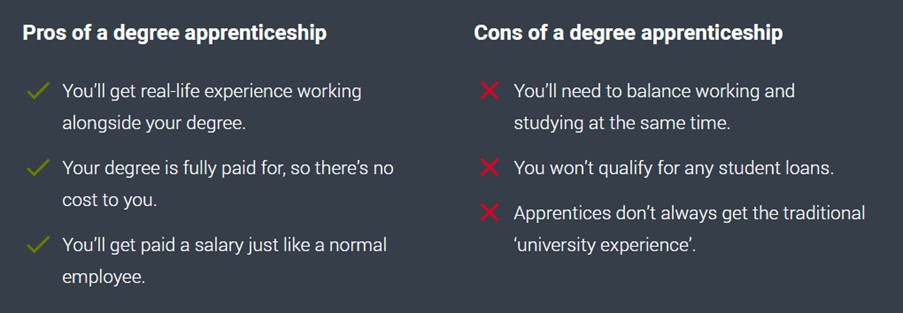Large employers must pay a 0.5% “Apprenticeship levy” of their annual pay bill and they can only get this money back if they use it to fund apprenticeship schemes. That can give those employers a significant incentive to make efforts to get that money and increase their workforce by adding apprentices.
The history of Pharmacist Apprenticeships
Pharmacist degree apprenticeships were first floated as a concept in 2019 by a secretive group including several large pharmacy employers. Their plans faced criticism as with no prior notice they attempted to get the proposal approved with the profession given less than two weeks’ notice of a consultation deadline.
The proposal itself was also flawed and lacked the perspective of the wider pharmacy sector. After thousands of PDA members objected over a single weekend, the proposal failed to get its first approval and was abandoned. However, soon afterwards it became apparent that a group of employers had reformed to work on a second attempt. This was not significantly progressed in public during the pandemic, though it seems these employers may have continued to meet and engage with others behind the scenes.
After comments made by HEE at the Clinical Pharmacy Congress, the General Pharmaceutical Council has confirmed that they have already agreed that final assessment will be the same for anyone wishing to enter the register, whether they follow the current MPharm traditional university degree or a potential degree apprenticeship route. Hence it seems that the details of the second attempt to create a pharmacist apprenticeship are about to emerge.
What is a degree apprenticeship?
UCAS outlines the degree apprenticeship route as follows;
“A degree apprenticeship enables you to gain a full undergraduate or master’s degree while you work. Degree apprenticeships take three to six years to complete, depending on the course level.
You’ll spend most of your time working and you’ll also study part-time at university. For example, you might go to university one or two days per week, or in short blocks, such as a week at a time. Overall, you spend about 20% of your time studying vs. 80% of your time working”.
The pros and cons of a degree apprenticeships for those on the scheme are described by UCAS as follows:

The suitability of apprenticeships to pharmacists
Apprenticeships can be legitimate ways to learn a profession and in some healthcare settings, pharmacy degree apprentices could be feasible, in a teaching hospital or GP practice for example where education and work-life can sit well together and other health professionals may have the time to supervise and mentor those who are learning. Here there is experience around high-level learning outcomes being achieved within a culture and environment where a range of healthcare professionals are at varying stages of their development and gaining valuable clinical experience. This is evidenced by the superior pass rates for pre-registration exam candidates from those sectors.

The most recent GPhC/PSNI exam results, shown above, evidence the significant difference in pass rates for those who trained in different sectors. It should be reiterated that those who undertook their pre-reg in community arrived having the benefit of four years university education before just one year in the Community sector lead to their exam performance.
There are some excellent independent community pharmacies lead by passionate pharmacists, who would want to deliver outstanding learning, however the sector overall is dominated by large corporate employers. PDA members are particularly concerned about the suitability of their working environments as being conducive to gaining a professional degree qualification. This is not just because of the poorer exam results, but because frontline employed and locum pharmacists know the reality of conditions in those workplaces.
This is a sector where the third largest employer apparently think they are so far removed from a clinical health setting that it is acceptable to ignore NHS guidance and permit COVID-19 positive staff to work around patients, and where more than 99% of pharmacists working for the largest employers say they experience unsafe staffing levels. These are just two examples of why the PDA believe that this particular environment is not suitable for the formation of a healthcare professional.
The level of supervision and mentoring required from already overstretched pharmacists working in under-staffed conditions, with some pharmacies prone to unpredictable closure due to a claimed “lack of staff” seems unattainable. In the PDA’s opinion the quality of the learning and development on offer in the 80% time at work for apprentices cannot reasonably be expected to deliver the equivalent of a full-time university and trainee route to qualification.
Pharmacists’ response
There are numerous organisations in pharmacy, but few actually speak for pharmacists, with many of the best funded public affairs functions in those bodies that speak for the shareholders and who may see benefit in getting their apprenticeship levy funds back.
In November 2019, the PDA along with the Guild of Healthcare Pharmacists issued a joint statement which included the following;
“We know that many pharmacists have concerns about the underlying motivations for this proposal and are concerned about the negative effect a poorly devised and delivered apprenticeship would have upon the profession as a whole. Many of our respective members are current employees in the employer group organisations and may well have very pertinent contributions to make.
As representative unions, we understand the environment in which pharmacists work and have an informed opinion on the suitability of such conditions and the impact they may have on professional learning in the workplace. This impact may be beneficial, but can be negative, particularly in some commercial settings. Therefore we cannot support the proposal unless and until there are realistic assurances that apprentices will enjoy robust, well rounded and effective education and study which meets the GPhC requirements for an MPharm course; the training will allow apprentices adequate time for revision, self-directed learning and rest; and most importantly will produce registrants who whilst being at no material disadvantage compared to registrants educated via the traditional route will not threaten the status, resilience and viability of the profession as a whole”.
Whilst many of the original misconceptions remain unaddressed and with limited engagement with the wider pharmacy sector and pharmacists thus far, it is unclear how the new “trailblazer” group of employers propose a degree apprenticeship to sit alongside the new IETP course. As since the previous proposal this now involves independent prescribing as part of the curriculum and far more varied workplace learning. It is widely considered that there is already lack of qualified DPPs to satisfy the current cohorts of students in the IETP programme, and particularly in community pharmacy, and apprentices would also need supervision.
Further, the conditions in community pharmacy have deteriorated over recent years particularly in the multiples with many pharmacists now refusing to practice in that environment.
The consequences of not having the traditional university experience may not be fully appreciated by those considering their future career avenues, however that very experience is essential to the formation of a well-rounded professional and the development of their “professional identity”, which is established during full time undergrad studies and includes important aspects such as peer support and professional socialisation.
The PDA will seek opportunities to influence the proposals and represent the views of members concerned about the impact of pharmacist apprenticeships.
Learn More
- Pharmacists apprenticeship development has been “paused” – DECEMBER 2019
- New proposals on pharmacist apprenticeship
- The questions answered about apprenticeships have raised even more serious concerns
- Apprenticeship proposal fails first test
- Responses from the Apprenticeship meeting
- Outcome of Pharmacist Apprenticeship Meeting
- Update on Pharmacist Apprenticeship Proposal
- PDA to convene meeting on apprenticeship proposal
- PDA facilitated large-scale response to unexpected pharmacist apprenticeship proposal, now we need to have questions answered
- PDA asks pharmacists to reject surprise pharmacist apprenticeship proposals
- PDA responds to apprenticeship consultations for health professionals
- Optometrists see eye to eye with Pharmacists as the two health professions face similar proposals
- PDA inspire new ophthalmic trade union
Not yet a PDA member?
If you have not yet joined the PDA, we encourage you to join today and ask your colleagues to do the same.
Membership is FREE to pharmacy students, trainee pharmacists, and for the first three months of being newly qualified.
Read about our key member benefits here.